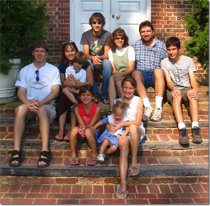Oceanus Hopkins had a rough start. His parents, fleeing persecution, crowded onto a ship headed for a new land. Fighting seasickness, rotting food, and the effects of tight living-quarters, Oceanus’s mother gave birth aboard the Mayflower making him the 32nd child to join the 102 travelers seeking a new life in Virginia. When a storm blew the ship far north to uncharted territory on the coast of Massachusetts, few anticipated the trials they would face. Forty-seven would die in the "Starving Time" of the first year.
Some historians credit the ultimate survival of the colony to the number of children who went to the new world. Because children had a higher survival rate than the adults, they added longevity to the colony. Before traveling to the new world, the children worked a variety of difficult jobs making them hardy, hard-working, and able to significantly contribute to the daily needs of the colony. On arrival they gathered food, helped build shelter, and learned survival techniques from the Wampanoag tribe which came to their aid. Oceanus Hopkins was born into this adventure. His name was added to the list of children who joined with the adults to face the trials of the new world head-on and create a new life.
As we pause this Thanksgiving, I have to admit that I am extremely thankful that I live in a different time. I will put my children to bed in a warm house which ably protects them from the elements. Their stomachs will be filled with nutritious food. Should they become ill, our doctor will likely be able both to tell me what is wrong and treat them.
Pilgrim parents couldn’t offer their children any of this. Rudimentary shelters, hastily built in the raw November days, offered meager sanctuary from the cold. Scanty portions of food barely took the edge off continual hunger plaguing the colony that first, bitter winter. When their children grew ill, parents could only pray for their child to beat the odds of a nearly inevitable death. I feel so fortunate compared to the Pilgrim parents. Yet, I wonder, “Am I doing as well by my children as they did by theirs?”
Though the trials are very different, today’s families face the challenge of building a life in the unknown much as our Pilgrim forefathers did. With the rush of ever-changing technology, financial upheaval, and the focus on global interdependence and connection; families are forging a new life in uncharted territory. The Pilgrims prepared their children to take a significant role as allies in their struggle and to work with them to build a better life. Have we taught our children to actively contribute to building a good life in the midst of the unknown? Are they:
· Strong enough to face hardship?
· Skilled enough to overcome it?
- What is our family mission: What do we want to stand for as a family? What do we want to accomplish in the coming year?
- What resources do we have to fulfill this mission—what tools, what connections, what gifts/skills does each member have to contribute?
- What challenges will we have to overcome?
- What will be the blessing of succeeding? What will we lose if we fail?
In our intense gratitude for all the blessings our children enjoy, let us not substitute passive reception of blessing for active involvement in creating blessing. Instead of shielding our children, may we work with them to create a vision for the future in which they actively participate and toward which they significantly contribute. Oceanus and the other Pilgrim children worked alongside their parents to lay the foundation of our nation. This Thanksgiving offers our families the opportunity to explore how we will work together to meet the challenges of today and to build a heritage for which future generations will pause to give thanks.
Labels: family issues, holidays, mission

